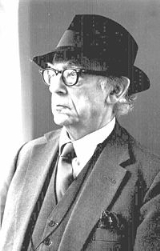
Isaiah Berlin
Topics
Isaiah Berlin
Quotations

Quotations
Sir Isaiah Berlin was a political philosopher and historian of ideas, regarded as one of the leading liberal thinkers of the 20th century.
Berkeley’s External World, unpublished lectures, Hilary Term 1947
- What is Life?
- (1) Tale told by an idiot full of sound and fury, signifying nothing.
- (2) Dictionary definition in biology (chemical process within organic entities involving metabolism etc.)
- (3) Mrs Woolf: ‘Life is a luminous halo, a semi-transparent envelope surrounding us from the beginning of consciousness to the end.’
- (4) Series of actual and hypothetical behavioural data which differ in certain assignable ways from data defining dead or inanimate entities.
- (5) That which the Lord infused into Adam. See Genesis 1. 4 [sc. 2. 7].
- Which?
- Mental Cramp.
Political Ideas in the Twentieth Century (1950)
- Injustice, poverty, slavery, ignorance – these may be cured by reform or revolution. But men do not live only by fighting evils. They live by positive goals, individual and collective, a vast variety of them, seldom predictable, at times incompatible.
Two Concepts of Liberty (1958)
- Everything is what it is: liberty is liberty, not equality or fairness or justice or culture, or human happiness or a quiet conscience.
- But to manipulate men, to propel them towards goals which you - the social reformer - see, but they may not, is to deny their human essence, to treat them as objects without wills of their own, and therefore to degrade them.
- All forms of tampering with human beings, getting at them, shaping them against their will to your own pattern, all thought control and conditioning is, therefore, a denial of that in men which makes them men and their values ultimate.
- The very desire for guarantees that our values are eternal and secure in some objective heaven is perhaps only a craving for the certainties of childhood or the absolute values of our primitive past.
- I am normally said to be free to the degree to which no man or body of men interferes with my activity. Political liberty in this sense is simply the area within which a man can act unobstructed by others. If I am prevented by others from doing what I could otherwise do, I am to that degree unfree; and if this area is contracted by other men beyond a certain minimum, I can be described as being coerced, or, it may be, enslaved. Coercion is not, however, a term that covers every form of inability. If I say that I am unable to jump more than ten feet in the air, or cannot read because I am blind, or cannot understand the darker pages of Hegel, it would be eccentric to say that I am to that degree enslaved or coerced. Coercion implies the deliberate interference of other human beings within the area in which I could otherwise act.
- If, as I believe, the ends of men are many, and not all of them are in principle compatible with each other, then the possibility of conflict — and of tragedy — can never wholly be eliminated from human life, either personal or social. The necessity of choosing between absolute claims is then an inescapable characteristic of the human condition. This gives its value to freedom as Acton conceived of it — as an end in itself, and not as a temporary need, arising out of our confused notions and irrational and disordered lives, a predicament which a panacea could one day put right.
Five Essays on Liberty (1969/2002)
- The fundamental sense of freedom is freedom from chains, from imprisonment, from enslavement by others. The rest is extension of this sense, or else metaphor.
- Those who have ever valued liberty for its own sake believed that to be free to choose, and not to be chosen for, is an inalienable ingredient in what makes human beings human.
- Those, no doubt, are in some way fortunate who have brought themselves, or have been brought by others, to obey some ultimate principle before the bar of which all problems can be brought. Single-minded monists, ruthless fanatics, men possessed by an all-embracing coherent vision do not know the doubts and agonies of those who cannot wholly blind themselves to reality.
- The simple point which I am concerned to make is that where ultimate values are irreconcilable, clear-cut solutions cannot, in principle, be found. To decide rationally in such situations is to decide in the light of general ideals, the overall pattern of life pursued by a man or a group or a society.
The Hedgehog and the Fox
- There exists a great chasm between those, on one side, who relate everything to a single central vision ... and, on the other side, those who pursue many ends, often unrelated and even contradictory ... The first kind of intellectual and artistic personality belongs to the hedgehogs, the second to the foxes.
Misc
- "Philosophers are adults who persist in asking childish questions." — quoted in The Listener, 1978.
Silverdale Interactive © 2026. All Rights Reserved.

